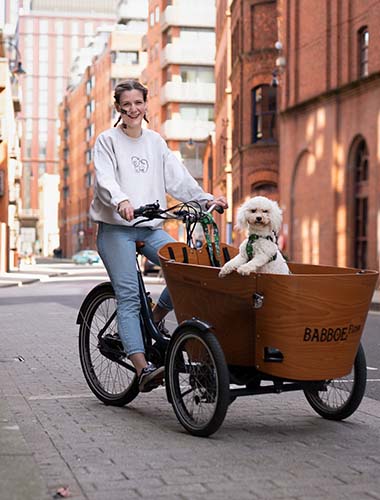Harrie Larrington-Spencer
Healthy Active Cities Researcher
Community Action

Harrie is a researcher in the Healthy Active Cities team and the Sustainable Housing and Urban Studies Unit at the University of Salford and is in the latter stages of completing her PhD in Human Geography at the University of Manchester.
Harrie’s research and personal interests focus upon sustainability and inclusive active travel and ensuring that the needs of disabled people are centralised within environmentalism. Harrie is a disabled cyclist and (along with her dog Frida) uses social media to demonstrate how brilliant and inclusive cycling can be, as well as highlighting the specific barriers that disabled cyclists face in their everyday travels. Recognising her work on inclusive active travel, Harrie has been invited by Mayor Andy Burnham to sit on the Greater Manchester Walking and Cycling Board which takes responsibility for the strategic approach to walking and cycling for transport within the region. Harrie is also a member of the British Cycling NorthWest Diversity and Inclusion Working Group.
Harrie has raised £10,000 to establish an inclusive cycle library within Greater Manchester. The library will enable disabled people to borrow non-standard cycles for free – and provide additional support including buddy riding and route planning, recognising that the cost of such cycles is a barrier to disabled people’s access and that one of the most important routes to start cycling for everyday journeys is to simply have access to a cycle and start giving it a go.
I love cycling and how inclusive it can be with so many different types of cycles and ways of cycling. I cycle a trike as my primary mode of transport, it’s not only convenient and good for the environment, but it’s great fun and incredibly good for both my physical and mental health. However, there are barriers that many disabled people will face in trying to access cycling, including the cost of cycles, not knowing about the diversity in types of cycles, cycling infrastructure and concerns about not being ‘good enough’ at cycling.
Through social media I share videos and photos of my own experiences and use these as tools to both highlight the barriers that disabled people face in getting cycling but also how adaptive cycling can be and most importantly how fun it can be!”

